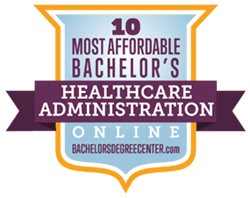
B.S. in Healthcare Management
Manage Your Future Through Regent’s Healthcare Management Degree Program
In the changing world of healthcare, there’s a need for strong leadership and management. Are you ready to take your place? Regent’s Bachelor of Science in Healthcare Management degree program, offered exclusively online, will help you understand the continuum of care in the U.S. healthcare system and make ethical managerial decisions. Learn the fundamentals of healthcare operations, informatics, marketing, accounting, organizational dynamics and more — all taught from a strong Christian foundation.
GROW YOUR KNOWLEDGE ABOUT HEALTHCARE MANAGEMENT
Explore key industry issues, such as healthcare legislation, informed consent, corporate liability, medical malpractice and patients’ rights.
BUILD ON A STRONG FOUNDATION
Anchor your knowledge and skill on Christian principles and values.
LEARN FROM THE BEST
Be mentored by faculty in Virginia Beach who hold the highest degrees in their field.
ALIGN YOURSELF WITH EXCELLENCE
Regent has been ranked among Top National Universities by the U.S. News & World Report for two consecutive years (2019 & 2020). Our programs have also been ranked by them as the #1 Best Online Bachelor’s Programs in Virginia for 8 years in a row. Experience the Regent difference.

On completing the B.S. in Healthcare Management degree program, you will be able to:
- Understand critical issues and market forces affecting this industry.
- Be competent in healthcare financing mechanisms and the industry’s influence on public policy.
- Understand the impact of health policy on key stakeholders.
Career Opportunities
- Medical Services Administration
- Long-term Care Administration
- Community Health Management
- Health Policy Analysis
- Health Promotion & Communication
- Public Health Information Analysis
Examines the role of financial data in the commercial enterprise; as well as measuring and reporting income, assets, liabilities, and equities.
Exploration of principles and activities in the commercial enterprise including topics such as product, price, promotion, place/channel, competition, company, and communication.
Examines from a Christian perspective, foundational leadership behaviors required of leaders within organization. Students will learn leadership theories and styles of communication, and develop strategies for implementing effective oral and written leadership communications in businesses and organizations.
Examines statistical theories, principles and concepts associated with business operations and processes. The course utilizes statistical methods and techniques to develop, implement and analyze business decisions designed to improve efficiency and productivity. Prerequisite: MATH 102 or 211 or equivalent.
Study of strategy development and deployment in the business enterprise and examines the overarching application of the role of a biblical worldview in the business enterprise. Prerequisites: BUSN 220, BUSN 240, and BUSN 320.
Examines macroeconomic theories, comparative economics, econometrics, macro-economic models, fiscal and monetary policy formation and analysis. Prerequisite: ECON 120 or ECON 260.
Various components of the U.S. healthcare system over the entire continuum of care. Attention given to private and public financing mechanisms, the forces of market competition, government regulation, and the impact of health policy on key stakeholders. Presents students with a variety of healthcare career options.
Day-to-day operational management of healthcare organizations including hospitals, private practice, ambulatory settings, and specialty services, with a focus on issues influencing the administration of today's healthcare organizations. Attention given to those issues that affect the delivery of care, and how decisions are made to develop new programs.
Practice in making managerial decisions in a wide variety of situations. Cases are presented that analyze current issues such as service-line management, healthcare reform, the medical home, accountable care organizations, community benefit, CEO compensation and other legal and cultural issues affecting the healthcare organization.
Introduction to the management of medical information systems in healthcare, emphasizing the optimization and customization potential of computer functions in the health services environment. Exploration of organizational and cost-benefit issues related to healthcare information systems, including clinical decision-support, integrated networking and distributed computing technologies, and universal medical records.
Complex financial models in healthcare organizations and the influence of public policy, the ACA and market conditions on the financial viability of the healthcare organization. Topics include financial statement analysis, working capital management, capital budgeting, cost of capital, variance analysis, financing techniques, and case studies. Prerequisite: BUSN 220.
Public health policy creation and the regulation of healthcare delivery in the U.S. Social, moral, and ethical issues associated with these policy decisions and regulations, such as corporate liability, medical malpractice, admission and discharge process, informed consent, patients' rights, and confidentiality of medical records. Prerequisite: HCMT 310.
Faculty approved practical experience in a healthcare organization including monitored work experience; and/or completion of a culminating management project involving submission of a written report and oral presentation building the case for a new healthcare program, policy, or expansion. Prerequisite: Senior standing.
The concepts, theories, and current practice regarding organizational structures and their development, the dynamics of individual and collective behavior within organizations; human interaction within organizations to foster and manage change. Emphasis on the role of leadership and cultural values. Prerequisite: Junior standing and prior management or leadership coursework.
Study of why employees behave as they do and how to promote behavior required to implement a focused business strategy using staffing, development, and reward systems.
Admission requirements vary based on the stage you’re at in life. Select a link below to learn how to apply.
2019-20 Tuition Rates
| Program Type | Tuition |
|---|---|
On-Campus Student
|
|
Online Student (enrolled in 8-week classes)
|
|
RN to B.S. in Nursing Tuition |
|
Student Fees
Fee | Amount | Description |
Application Fee (On-Campus & Evening/Online Students)
| $50 | One-time fee, nonrefundable |
Enrollment Deposit (On-Campus Students) Enrollment Deposit (Evening/Online Students) | $150
| Fee is deducted from tuition costs |
Graduation Fee(On-Campus & Evening/Online Students) | $60 | One-time fee upon submission of graduation application |
University Services Fee(On-Campus Students) | $700/semester | Contributes to university academic and administrative operations |
Optional Fees
Late Payment | $100/Session | Incurred per session in the event of late tuition payment |
Course Fees | Varies, | Some courses in theater, animation, cinema television or science labs carry an additional fee |
2020-21 Tuition Rates
| Program Type | Tuition |
|---|---|
On-Campus Student
|
|
Online Student (enrolled in 8-week classes)
|
|
RN to B.S. in Nursing Tuition |
|
Student Fees
Fee | Amount | Description |
Application Fee (On-Campus & Evening/Online Students)
| $50 | One-time fee, nonrefundable |
Enrollment Deposit (On-Campus Students) Enrollment Deposit (Evening/Online Students) | $150
| Fee is deducted from tuition costs |
Graduation Fee(On-Campus & Evening/Online Students) | $60 | One-time fee upon submission of graduation application |
University Services Fee(On-Campus Students) | $750/semester | Contributes to university academic and administrative operations |
Optional Fees
Late Payment | $100/Session | Incurred per session in the event of late tuition payment |
Course Fees | Varies, | Some courses in theater, animation, cinema television or science labs carry an additional fee |

